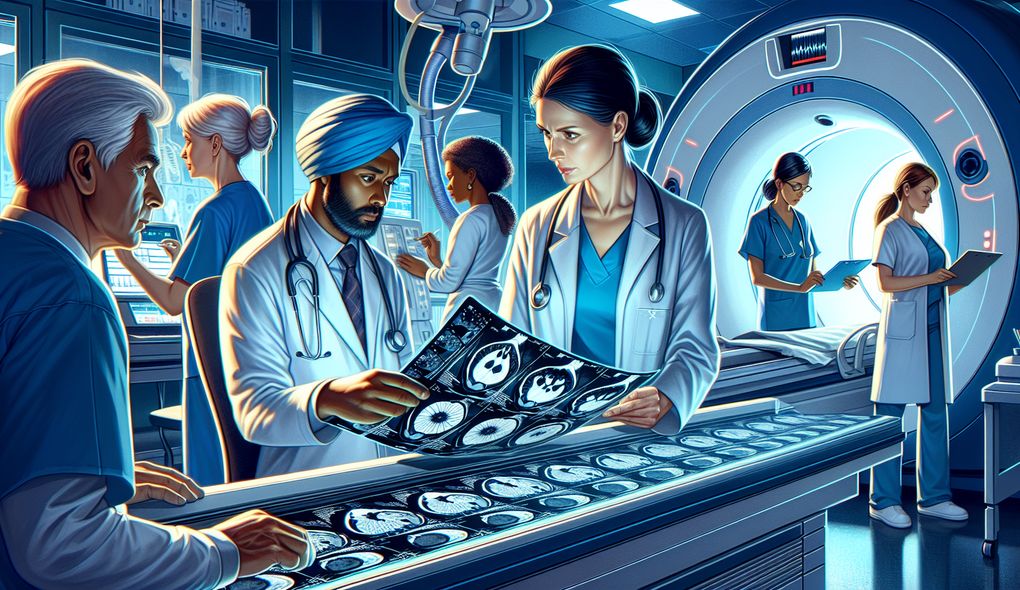What is your approach to handling emergencies in the radiology department?
JUNIOR LEVEL

Sample answer to the question:
In an emergency situation in the radiology department, my approach is to remain calm and quickly assess the situation. I would immediately notify the necessary individuals, such as the radiologists, nurses, and hospital administration. I would coordinate with the staff to ensure proper patient care and safety measures are in place. Additionally, I would communicate with other departments, such as the emergency department, to provide updates and receive any necessary instructions. Throughout the emergency, I would prioritize the well-being of the patients and staff, making decisions that align with hospital policies and regulatory requirements.
Here is a more solid answer:
In an emergency situation in the radiology department, my first priority would be to ensure the safety of the patients and staff. I would immediately activate the emergency response protocol and notify the necessary individuals, including the radiologists, nurses, and hospital administration. As a leader, I would delegate tasks to the team members and provide clear instructions to ensure a coordinated response. I would also assess the situation and make critical decisions to prioritize patient care and allocate resources effectively. Throughout the emergency, I would maintain effective communication with other departments and healthcare professionals to provide updates and collaborate on the best course of action. I would document the events and actions taken for future reference and improvement.
Why is this a more solid answer?
The solid answer expands on the basic answer by providing more specific details and examples that align with the job requirements. It demonstrates the candidate's leadership and supervisory skills, critical thinking and problem-solving skills, organizational and multitasking abilities, as well as their capacity to work under pressure in a fast-paced environment. However, it could further enhance the answer by incorporating more examples to showcase the candidate's technical proficiency with radiologic equipment and software.
An example of a exceptional answer:
Handling emergencies in the radiology department requires a systematic and proactive approach. Firstly, I would ensure that the department is well-prepared for emergencies by conducting regular drills and training sessions with the staff. This would include familiarizing them with emergency protocols, ensuring they are proficient in operating the necessary equipment, and refreshing their knowledge of relevant health and safety guidelines. In an actual emergency, I would employ a triage system to prioritize patient care based on the severity of their condition. I would work closely with the radiologists to expedite imaging interpretations and communicate with other departments to facilitate necessary interventions. To maintain order and efficiency, I would document all actions taken and debrief the team afterward to identify areas for improvement. Additionally, I would stay updated on the latest advancements in radiologic technology and best practices to enhance the department's emergency response capabilities.
Why is this an exceptional answer?
The exceptional answer goes above and beyond by incorporating additional strategies and considerations for handling emergencies in the radiology department. It showcases the candidate's proactive approach to preparedness, their ability to prioritize patient care, and their commitment to continuous improvement. The answer also highlights the candidate's dedication to staying updated on advancements in radiologic technology, which aligns with the job requirement of technical proficiency. Overall, the exceptional answer demonstrates a comprehensive understanding of the role and responsibilities of a Radiology Department Supervisor in emergency situations.
How to prepare for this question:
- Familiarize yourself with the emergency protocols and procedures specific to the radiology department.
- Review and refresh your knowledge of relevant health and safety guidelines.
- Stay updated on the latest advancements in radiologic technology and best practices.
- Practice decision-making and problem-solving in high-pressure situations through scenarios or role-playing exercises.
- Seek opportunities to develop your leadership and communication skills.
What are interviewers evaluating with this question?
- Leadership and supervisory skills
- Critical thinking and problem-solving skills
- Organizational and multitasking abilities
- Attention to detail
- Technical proficiency with radiologic equipment and software
- Capacity to work under pressure in a fast-paced environment

